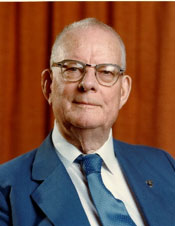
He is often credited with helping the Japanese rebuild their economy after World War II. Dr. Deming spent years developing a methodology to help companies move forward. It is still valid today. He called this methodology his “System of Profound Knowledge. This system is composed of four bodies of knowledge:
- Appreciation for a system
- Knowledge of variation
- Theory of knowledge
- Knowledge of psychology
Each body of profound knowledge is briefly introduced below.
Appreciation for a System
The first part of profound knowledge is understanding what a system is. Those of you familiar with Dr. Deming will recognize the figure of a system below.
A system must have a purpose – an aim is what Dr. Deming called it. Without a purpose, there is no system. The aim is really the optimization of the system over time.
Knowledge of Variation
Variation is always present. But do you truly understand variation? Far too often, we look at variation as meeting or not meeting some target. Dr. Deming helped changed the paradigm of variation. His teaching (based on the work of Walter Shewhart) separated variation into two types: common and special causes. Common causes of variation represent the natural variation in a process; special causes of variation are not supposed to be present in the process.
Management is responsible for reducing the effects of common cause of variation. Dr. Deming estimated that 94% of an organization’s problems come from common cause of variation. Our previous blog, The Red Bead Experiment, describes a great way to explain variation.
Theory of Knowledge
Dr. Deming said: “Knowledge comes from theory.” To learn, one must have a theory. Without theory, we cannot make predictions about what might happen. Theory is a prerequisite for learning.”
Suppose a recent process change has decreased the variation in product output. Why did this occur, i.e., why did the process change decrease the variation? “I don’t know, we just decided to try it and it worked.” Have you learned anything? “Of course, we learned that the change worked.” Was the improvement due to the change or something else that may have changed without your knowledge? “I don’t know.” You must have a theory to learn.
Knowledge of Psychology
What motivates people? Answer – different things. As a manager, one must understand that people are different. The manager “must be aware of these differences and use them for optimization of everybody’s abilities and inclination.” To do this, a manager must understand motivation and psychology.
Dr. Deming believed that people had a right to “joy on the job.” And that management must drive out the fear that their management system has created.
We have five publications in our SPC Knowledge Base about Dr. Deming and his System of Profound Knowledge if you want to learn more about this remarkable man.
